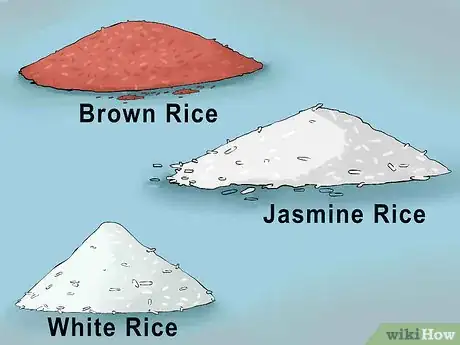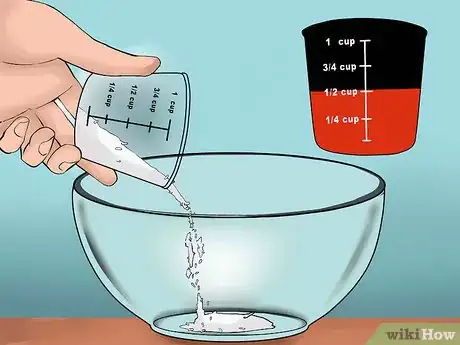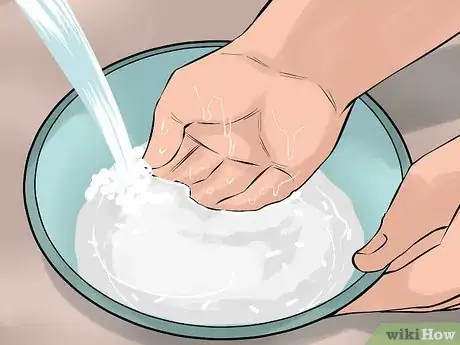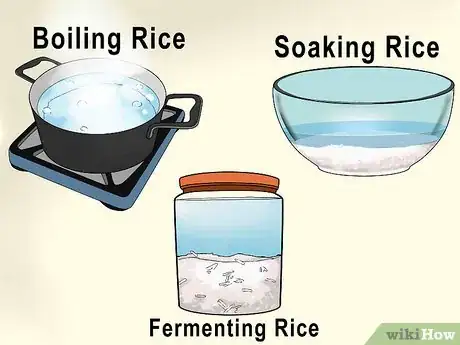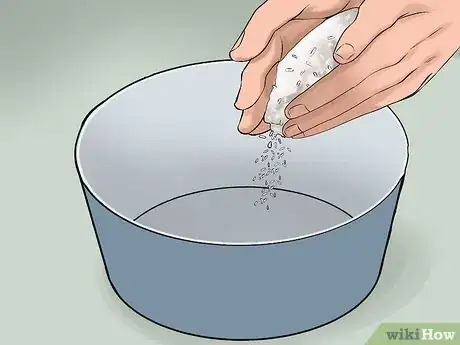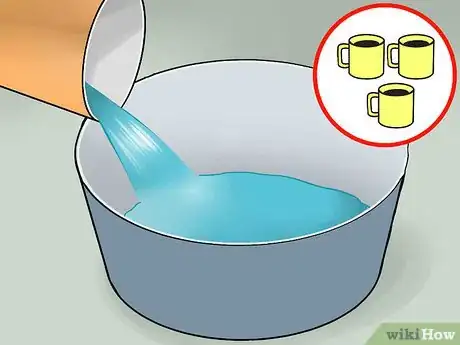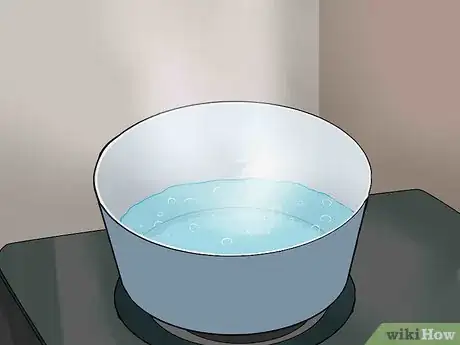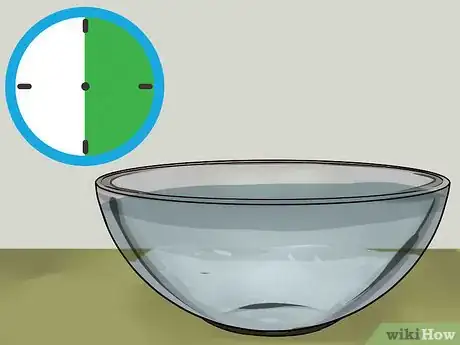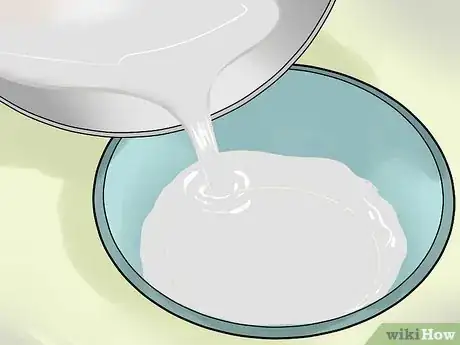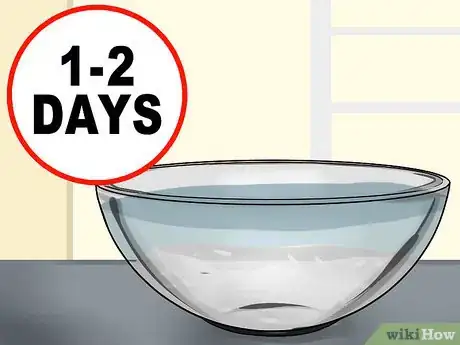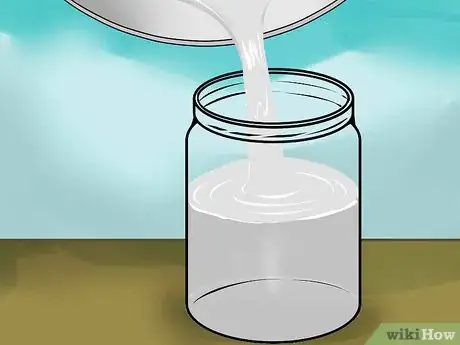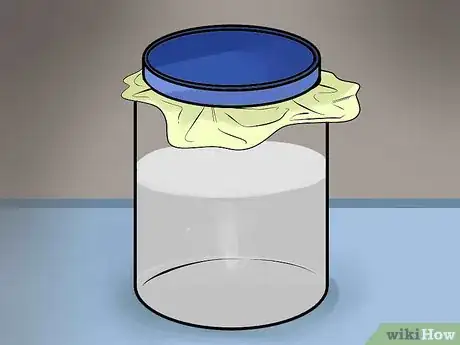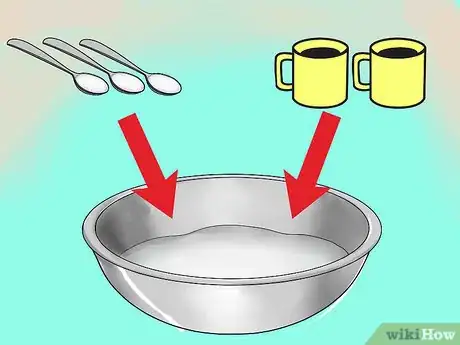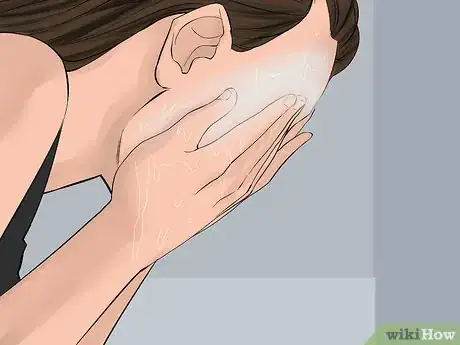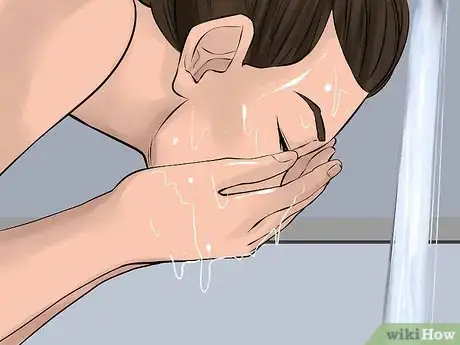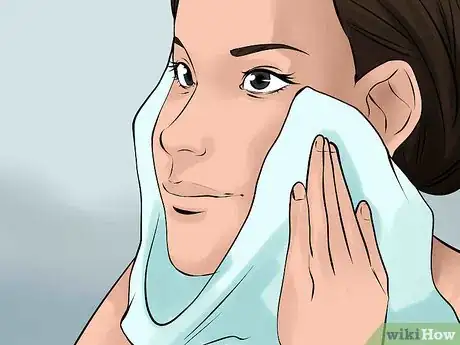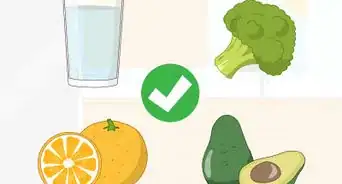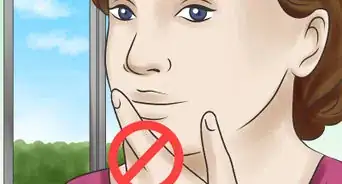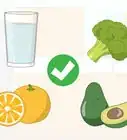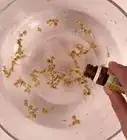This article was co-authored by Laura Martin and by wikiHow staff writer, Danielle Blinka, MA, MPA. Laura Martin is a Licensed Cosmetologist in Georgia. She has been a hair stylist since 2007 and a cosmetology teacher since 2013.
wikiHow marks an article as reader-approved once it receives enough positive feedback. In this case, 95% of readers who voted found the article helpful, earning it our reader-approved status.
This article has been viewed 471,264 times.
Originating in Asian cultures, rice water is a natural cleansing option for washing your face. It works well as a gentle toner and cleanser, but isn’t strong enough to remove makeup or clarify oily skin. Made with just water and rice, you can use it to achieve better-looking, tighter skin without harsh chemicals. To wash your face with rice water, you will need to prepare the rice, make your rice water, and cleanse your face.
Steps
Preparing the Rice
-
1Choose your rice. You can prepare rice water with any type of rice, though white, brown, and jasmine rice are common options. If you already own rice, whatever kind of rice you have on hand will work.
-
2Put 1/2 cup (92.5 g) of rice into a bowl. If you want to make large quantities of rice water, you can increase the amount of rice that you use, as long as you remember to also increase the water. Keep in mind that rice water has a shelf life of 1week.[1]Advertisement
-
3Wash the rice. Pour water over the rice and swirl the water to remove dirt. Strain out the rice and return it to the empty bowl. Repeat the steps to wash your rice a second time.
Making Rice Water
-
1Decide how to prepare the rice water. You can make rice water by boiling rice, soaking rice, or fermenting soaked rice water. Which type you pick will depend on how much time you have and how you want to use the rice water.
- Boiling your rice will create a concentrated batch of rice water, so it’s stronger. You will need to mix it with clean water when you use it.[2]
- Soaking your rice is the simplest method because you have fewer steps and don’t need to attend your rice water while it’s soaking. Because it’s not concentrated, you may run out faster.
- Fermenting your rice water takes the most time, but the fermentation process brings out more vitamins and nutrients.
-
2Transfer your rice to an appropriate container. After rinsing the ½ cup (92.5 g) of rice, you’ll need to put it in a different container. If you are boiling your rice, place it in a lidded pot. Otherwise, place your rice in a clean bowl.
-
3Add 3 cups (710 ml) of water. You will use more water than you would normally use to make rice so that you will have leftover water once you’re finished cooking the rice.[3]
- Ignore the directions on your rice packaging. Using those directions, you will not have leftover rice water.
-
4Boil your rice for concentrated rice water. While boiling the rice to make rice water takes more effort, the results are more potent, so you can use less of it.
- Bring the water to a boil.
- Pour in your rice, cover the container, and then cook it on medium-low heat for 15-20 minutes.
- Allow your boiled rice to cool before handling it.
-
5Soak your rice for 15-30 minutes to get diluted rice water. Soaking requires less work but the results will be less potent. You will also not need to dilute your rice water if you soak your rice. Be sure to cover the container while the rice is soaking.
- If you plan to ferment your rice water, soaking the rice is the best way to prepare the rice water before fermentation.
-
6Strain out the rice after boiling or soaking it. Drain the rice water into a separate container. Drain it more than once so that you won't find any rice grains in the water. Your rice water will have a milky-white color.[4]
-
7Decide if you want to ferment your soaked rice water. To ferment your rice water, place rice water that you prepared by soaking into a container. Allow your rice water to sit for 1-2 days uncovered. When it begins to smell sour, place it into the refrigerator to stop the fermentation process.
- Dilute fermented rice water with 1–2 cups (240–470 ml) of clean water because it is very potent.[5]
-
8Pour your rice water into a container. You will need to store your rice water in a sealed container, so choose something like a jar, a food storage container, or a lidded carafe.
-
9Store your rice water in the refrigerator. It will last for up to 1 week if properly stored.[6]
Cleansing With Rice Water
-
1Dilute your rice water if it’s boiled or fermented. If you are using boiled or fermented rice water, measure out 2–3 tablespoons (30–44 ml) tablespoons and add it to 1–2 cups (240–470 ml) of water. If you are using soaked rice water, skip this step.[7]
-
2Splash the rice water onto your face or apply it with a cotton ball. Over the sink or in a shower, use your hands to wash your face with the rice water. Repeat this action 4-6 times. Alternatively, you can dip a cotton ball in rice water and lightly rub it over your face.
-
3Rinse your face with clean water if desired. You can cleanse away the rice water using clean water. The nutrients in the rice water will remain in your skin. Alternatively, you can allow the rice water to air dry on your skin.
-
4Pat your face dry with a towel if you rinsed it. Make sure your towel is clean to avoid transferring bacteria back onto your skin.
Expert Q&A
-
QuestionHow do you prepare rice water?
 Laura MartinLaura Martin is a Licensed Cosmetologist in Georgia. She has been a hair stylist since 2007 and a cosmetology teacher since 2013.
Laura MartinLaura Martin is a Licensed Cosmetologist in Georgia. She has been a hair stylist since 2007 and a cosmetology teacher since 2013.
Licensed Cosmetologist You should first rinse the rice to remove dirt. Next, you can make rice water by adding rice to cool water and letting it sit for 15-30 minutes.
You should first rinse the rice to remove dirt. Next, you can make rice water by adding rice to cool water and letting it sit for 15-30 minutes. -
QuestionIs rice water good for acne?
 Laura MartinLaura Martin is a Licensed Cosmetologist in Georgia. She has been a hair stylist since 2007 and a cosmetology teacher since 2013.
Laura MartinLaura Martin is a Licensed Cosmetologist in Georgia. She has been a hair stylist since 2007 and a cosmetology teacher since 2013.
Licensed Cosmetologist Yes. Rice water is great for soothing the skin, making it ideal for acne. You may want to ferment your rice water for maximum benefits.
Yes. Rice water is great for soothing the skin, making it ideal for acne. You may want to ferment your rice water for maximum benefits. -
QuestionCan you wash your face with salt water?
 Laura MartinLaura Martin is a Licensed Cosmetologist in Georgia. She has been a hair stylist since 2007 and a cosmetology teacher since 2013.
Laura MartinLaura Martin is a Licensed Cosmetologist in Georgia. She has been a hair stylist since 2007 and a cosmetology teacher since 2013.
Licensed Cosmetologist You can wash your face with salt water, but be aware that it's quite drying. Salt water can be good for oily and acne-prone skin but probably isn't suitable for other skin types.
You can wash your face with salt water, but be aware that it's quite drying. Salt water can be good for oily and acne-prone skin but probably isn't suitable for other skin types.
Warnings
- Make sure that you remove all rice from the water, as even a speck can get into your eye and cause pain and irritation.⧼thumbs_response⧽
- Remember to dilute concentrated rice water prepared with boiling or fermentation.⧼thumbs_response⧽
- If you boil your rice, be careful not to burn yourself.⧼thumbs_response⧽
- If you have sensitive skin, try the rice water on a small patch of skin before using it as it could irritate your skin.⧼thumbs_response⧽
Things You'll Need
- Rice
- Water
- Bowl
- Storage container
- Pot with a lid (optional)
References
- ↑ http://www.healthyandnaturalworld.com/rice-water-for-hair-and-skin/
- ↑ http://www.healthyandnaturalworld.com/rice-water-for-hair-and-skin/
- ↑ http://www.healthyandnaturalworld.com/rice-water-for-hair-and-skin/
- ↑ http://www.healthyandnaturalworld.com/rice-water-for-hair-and-skin/
- ↑ http://www.healthyandnaturalworld.com/rice-water-for-hair-and-skin/
- ↑ http://www.healthyandnaturalworld.com/rice-water-for-hair-and-skin/
- ↑ http://www.healthyandnaturalworld.com/rice-water-for-hair-and-skin/
- ↑ http://www.healthyandnaturalworld.com/rice-water-for-hair-and-skin/
- ↑ http://www.healthyandnaturalworld.com/rice-water-for-hair-and-skin/
About This Article
To wash your face with rice water, start by rinsing 1/2 cup of any kind of rice to remove the dirt. Next, place the rice in a bowl with 3 cups of water and let it sit for 30 minutes before straining out the rice. Then, splash the rice water onto your face 4 to 5 times until it coats your skin. Alternatively, dip a cotton ball in the rice water and lightly rub it onto your face. Then, rinse your face with fresh water and pat it dry with a clean towel. To learn how to store your rice water if you're not using it right away, read on!
